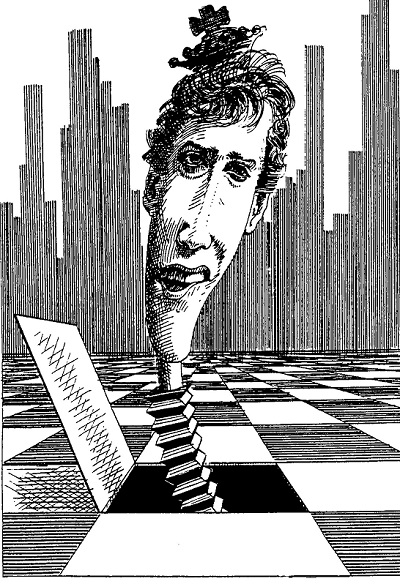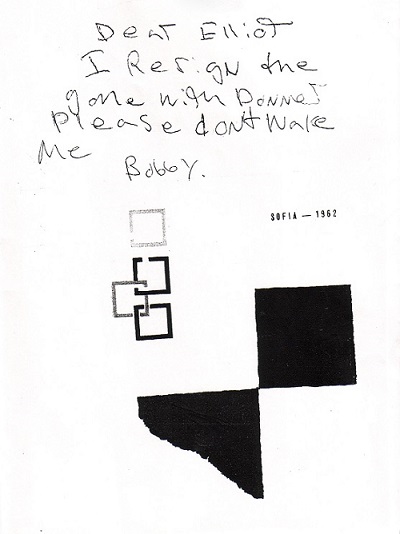
Robert James Fischer komt als ‘Als een duveltje uit een doosje’ uit het schaakbord. Dat kan op meerdere manieren betrekking hebben op de carrière van ‘Bobby’.
Hoewel zijn resultaten van jongs af aan extreem goed waren, was het misschien toch nog onverwacht dat Bobby in 1957 als veertienjarige kampioen van de Verenigde Staten werd met 10½ uit 13. Of zou Rupert doelen op de grootmeestertitel die Bobby in 1958 als – op dat moment – jongste schaker ooit wist te behalen? Of is het gezegde van toepassing op het gedrag van Fischer? Dat lijkt het meest waarschijnlijke, want Bobby heeft zich vaak ‘onverwacht’ gedragen. Vaak vanwege zijn principes, zoals toen hij zich terugtrok uit het interzonetoernooi van Sousse in 1967.
Het wereldkampioenschap van 1972 was het toppunt van zijn onvoorspelbare gedrag. Bij de onderhandelingen kwam hij steeds weer met nieuwe eisen en ook tijdens de match kwam hij diverse keren met nieuwe eisen. De Britse bankier James D. Slater verdubbelde het prijzengeld tot 125.000 dollar, zodat aan Bobby’s eis voldaan werd. Elke schaakliefhebber zal zich ook het begin van de match in Reykjavik heugen: de eerste partij verloor Fischer en de tweede partij kwam hij niet opdagen omdat hij zich stoorde aan de camera’s in de speelzaal. Twee-nul voor Spasski en de WK-match leek al geëindigd voordat hij goed en wel begonnen was. Het zal FIDE-voorzitter Max Euwe ongetwijfeld wanhopig hebben gemaakt, al is de ‘match van de eeuw’ wonder boven wonder voltooid. Voor de WK-match in 1975 tegen Karpov had Fischer weer een behoorlijk eisenpakket, maar nu hield Euwe (FIDE) zijn poot stijf. Karpov werd zonder te spelen tot wereldkampioen gekroond. Achteraf gezien waren de eisen van Fischer een opmaat naar een professionelere schaakwereld, waar de generaties na hem van geprofiteerd hebben.
Euwe en Fischer kenden elkaar al veel langer. Zo speelde de 55-jarige Euwe in maart 1957 al een match met de jonge Fischer. De eerste partij won Euwe overtuigend en in de tweede partij bood Euwe in goede stelling remise aan, zodat hij de match won met 1½-½. Daarna kwamen ze elkaar regelmatig tegen in de schaakwereld, bij Olympiades, toernooien en matches. Euwe was bijvoorbeeld teamleider van ‘Rest of the World’ toen die in 1970 een match tegen de USSR speelde. Euwe had volgens de Elo-lijst Fischer op bord één geplaatst, maar daar was Larsen het niet mee eens, omdat Fischer al bijna twee jaar geen officiële partij had gespeeld. Euwe ging naar Fischers hotelkamer om deze lastige materie te bespreken, maar de klus bleek in no-time opgelost: Fischer had geen bezwaar om op bord twee te spelen. Achteraf ging het verhaal dat hij wereldkampioen Spasski wilde ontlopen…
Uiteraard leeft Fischer ook in het Max Euwe Centrum voort. Er hangt een poster van hem in onze bibliotheek, Fischer komt voor in ons filmpje over de wereldkampioenen, we hebben een speciale map met krantenknipsels over hem, er staan tientallen boeken over Fischer in de bibliotheek en we hebben op onze filmmiddagen (CinéMax) vaak documentaires over hem vertoond. Het leukste attribuut is echter het originele briefje waarmee Fischer zijn afgebroken partij tegen Donner opgaf (‘I resign the game with Donner. Please don’t wake me’) in de Olympiade van Varna 1962. (ES)

Bobby Fischer
Robert James Fischer jumps from the chessboard like a jack-in-the-box. This can relate to Bobby’s career in a number of ways.
Although his results were extremely good at a young age already, it may still have come as a surprise that Bobby became the United States Champion in 1957 as a fourteen-year-old, with 10½ points out of 13 games. Or was Rupert referring to the grandmaster title Bobby conquered in 1958, as the youngest chess player ever at the time? Or does the phrase refer to Fischer’s behaviour? The latter explanation seems to be the most probable, since Bobby often behaved ‘surprisingly’ – often on account of his principles, like when he withdrew from the Sousse Interzonal Tournament in 1967.
The 1972 World Championship Match with Boris Spassky saw the culmination of his unpredictable behaviour. During the negotiations, he kept coming up with new demands, and also during the match he made new demands several times. The British banker James D. Slater doubled the prize fund to 125,000 dollars, meeting Bobby’s demand. Also, no chess fan will ever forget the start of this match: Fischer lost the first game, and didn’t turn up for the second because he felt disturbed by the cameras in the playing hall. Spasski was leading 2-0, and the World Championship Match seemed to have ended before it had actually begun. FIDE president Max Euwe must have been driven to despair by all this, but by a miracle of miracles the ‘Match of the Century’ was completed after all. Before the World Championship Match in 1975 against Anatoly Karpov, Fischer again came up with a sizeable list of demands, but this time Euwe (FIDE) didn’t budge. Karpov was crowned the new World Champion without playing. With hindsight, Fischer’s demands were a prelude to a more professional chess world, and the generations that came after him have profited from it.
Euwe and Fischer had known each other for a long time already. As a 55-year-old, Euwe played a match with the young Fischer in March 1957. The first game was convincingly won by Euwe, and in the second game the Dutchman offered a draw in a good position, winning the match by 1½-½. After that, they regularly came across each other in the chess world, during Olympiads, tournaments and matches. For example, Euwe was the captain of the ‘Rest of the World’ team when it played a match against the USSR in 1970. In accordance with the Elo list, Euwe had placed Fischer on board one, but Bent Larsen didn’t agree to that since Fischer hadn’t played an official game for almost two years. Euwe went to Fischer’s hotel room to discuss this tricky matter, but the problem was solved in no time: Fischer had no objection to playing on board two. After the match, the story went that he had wanted to evade World Champion Spassky…
Of course, Fischer’s legend lives on also in the Max Euwe Centre. He features on a poster in our library, he also appears in our film on the World Champions, there are dozens of books on Fischer in our library, and during our film matinees (CinéMax) we have often shown documentaries about him. However, the nicest attribute is the original note with which Fischer resigned his adjourned game versus Hein Donner (‘I resign the game with Donner. Please don’t wake me’) at the Varna Olympiad in 1962. (ES)